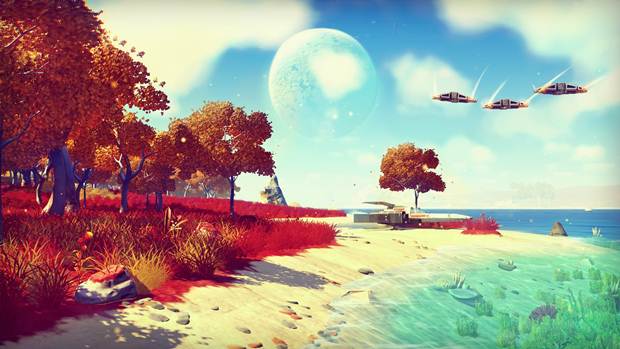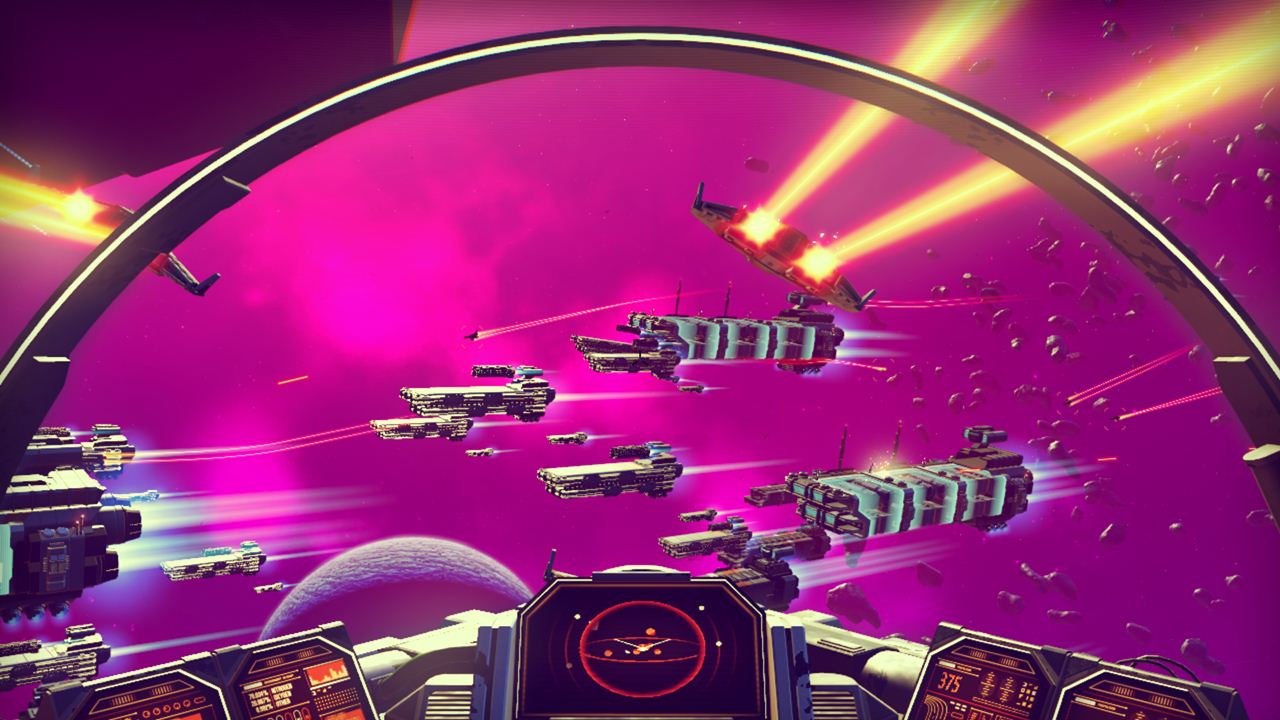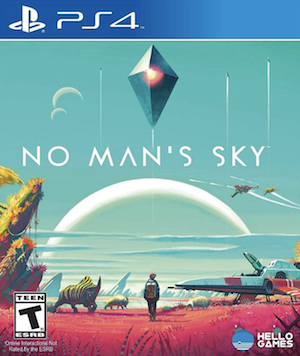
No Man’s Sky is a bold and ambitious game- it promises the player literally the universe, and all of its boundless infinity. It promises the player the joy of exploration and the wonder of discovery. It promises us a collective effort to chart an entire universe, something of the kind that has never been attempted in this medium before. Above all, for the millions of us who in our lifetimes will be stranded on earth, this game promises us a journey through deep space that pushes the limits of our imaginations, as we chart new waters, discover new planets, encounter exotic new species, and engage with a lost ancient alien civilization.
‘Infinity’ is a lot for a game to promise- but No Man’s Sky largely delivers on it. Playing No Man’s Sky is a revelation, and is quite unlike anything else on the market. In a lot of ways, it feels unreal to be playing a game of this scope and ambition, and also knowing that it was made by a team of less than two dozen people- given how the most mammoth AAA projects tend to feel overly linear and limited, it almost leads to a kind of dissonance. But all those thoughts are washed away, as you land on another planet that you just discovered, get to name it whatever you want, and then set out to interact with its lifeforms and biomes, before you collect your resources, and you’re on your way again across the recesses of deep space.
"‘Infinity’ is a lot for a game to promise- but No Man’s Sky largely delivers on it."
Let’s get this out of the way first- No Man’s Sky stumbles in a lot of important areas. On the PS4, the game has a very narrow FoV, which is enough to induce nausea in a lot of instances, especially when coupled with the game’s low (but mostly steady, outside of some instances) frame rate as well as pop in. Some very basic features are missing in the game, such as custom markers (you would think being able to mark a point of interest that you stumbled upon in a universe of 18 quintillion planets, one that you plan to return to later, would be something the game lets you do- you’d be wrong), limited inventory space, a lack of quick travel options, and so on and on and on. I am not going to claim No Man’s Sky is a flawless game, because it is not.
But none of the flaws matter even a little bit once you start to actually play the game. I can tell you that I personally ignored my (increasingly strong) nausea just so I could spend more time in the worlds of No Man’s Sky.
The core gameplay loop of No Man’s Sky is rather simple- you land on a planet, you exit your ship, you scan your surroundings to see any points of interest, you walk up to them. You collect any resources, you encounter local wildlife, you try to make sure the planet and its environment and climate don’t kill you, and you leave, ready to hop into another planet, or maybe to another star system entirely, as you continue making your way to the center of the universe. Along the way, you get to rename any planets or species you got to encounter and discover, as long as you were the first one to do it (and given the size of No Man’s Sky universe, you almost certainly will be each time, in spite of the amount of players playing the game), encounter relics of an ancient alien civilization that hold the keys to your progress, and maybe find trading outposts to trade resources. On some occasions, you probably also end up in combat, and try your best to kill and not be killed.
"No Man’s Sky stumbles in a lot of important areas."
The true strength of No Man’s Sky lies in just how flexible this core gameplay loop really is- you can choose to play as anything you want within this framework. You could be an explorer, charting new planets and cataloguing new species, or you could be a trader, trying to dump cheaper and plentiful resources for rarer ones, and then selling those at a hefty profit. You could be a colonizer, trying to claim as many planets as yours as is possible, or you could be an aggressive invader, fighting space pirates, attacking local life, and killing sentinel drones. You could just try to stay on track and focus on the story and campaign, and not worry too much about the wealth of side activities in the game. Or you could mix and match any and all of them. Owing to its sheer flexibility, No Man’s Sky theoretically should never get repetitive.
It is therefore a shame that the game sometimes funnels you to do specific things- for instance, for the first few hours of the game, you’d hardly know that this was meant to be an exploration title, as you’re kept on the surface of the planet you crash landed on, and sent on glorified fetch quests to collect the resources you need to fix your ship. For a while, there is this sinking sensation that the game may just be Minecraft or at best, Day-Z, in a space setting. Once you’re finally off the surface is when it opens up to you (and then again later, when you get our hands on a hyperdrive), but those first few hours frankly suck, and lead to a feeling of sinking disappointment with the game.
There are also times when the game specifically funnels you into combat situations- there are entire planets, for example, where the presence of the sentinel drones, that make sure that the local ecosystem is not disturbed, is heavy- so even mining resources lightly alerts them, leading to them to attacking you constantly. It doesn’t help that No Man’s Sky‘s combat is, at best, serviceable, and at its very worst, appalling, and devoid of any challenge, except for when you are swarmed by enemies, which happens often.
"The true strength of No Man’s Sky lies in just how flexible its core gameplay loop really is."
Owing to the game’s procedural generation, your very first planet could be a toxic planet with sparse resources, aggressive wildlife, and heavy sentinel presence- or maybe you could run into a batch of worlds later that are either all basically empty and complete pushovers, or so hostile that you are literally not equipped to deal with them at the time. This completely breaks any semblance of a meaningful progression curve in the game.
The good thing is, unfortunate instances where a player gets a poor and hostile first planet aside, the game offers you enough freedom that if you run into one, or a batch of, bad planets, you can just take off and go look for some other planets that are more suited to what you are looking for. No Man’s Sky is a game that is entirely malleable- you will get exactly what you want from it, and you will get it, with few exceptions, when you want it.
There is an argument to be made that something like that is anathema for a lot of players- a lot of players don’t want a game that is so devoid of an overarching structure, or sense, or purpose. Such players would argue that No Man’s Sky, devoid of any context, is ultimately meaningless, as is everything you do in it- so why bother? These players aren’t necessarily wrong, because their arguments do hold water- but they are also playing the wrong game. No Man’s Sky is a game that works exactly because of its lack of contextual structure. It is a game that takes this kind of meaningless meandering, and runs with it, turning it into its largest strength. If something like that is not appealing to you, then you will not like No Man’s Sky, and it is not for you- but for others, No Man’s Sky delivers exactly what they want: a massive universe for them to explore, and for them to explore on their own terms.
"No Man’s Sky succeeds exactly where it needs to the most- it succeeds in delivering upon its astronomical ambitions."
It also helps that it’s is a world that you want to explore more- each world in No Man’s Sky is gorgeous, its lifeforms exotic, all rendered with a beautiful artstyle that covers for any deficiencies that the graphics may otherwise have. Each world has its own sense of character, and the worlds are likely to stand out in your memory long after you have departed them- especially if you got to name them, too, which leads to you, the explorer, developing a special connection with them. Most of the times, in spite of the survival elements, and in spite of the combat situations, No Man’s Sky is a very relaxing game, as you land on a world, and walk around, taking its vistas and locales in, before you set off to see more of the sights that this infinite universe has to offer. Coupled with the game’s soundtrack, there is a sense of zen-like calm and beauty that can be attained by playing this game and letting yourself sink into its worlds entirely- and at that point, all of its litany of flaws fail to matter. No Man’s Sky succeeds exactly where it needs to the most- it succeeds in delivering upon its astronomical ambitions.
And in the end, that’s what it comes down to. No Man’s Sky staggering ambition, which it largely delivers upon, compensates for any other flaws that it might have. This is a game about the beauty, wonder, and joy of exploration, and it is a game that lets you play it at your own pace, how you want to, when you want to, and where you want to. Truly infinite, boundless in its possibilities, and presenting its players with a universe of possibilities, No Man’s Sky is a triumph, and is set to go down in history as one of the defining titles of our era- stumbles and all.
This game was reviewed on the PlayStation 4.
Gorgeous artstyle, beautiful soundtrack, technical marvel; staggering ambition that is almost entirely realized; flexible gameplay loop that lends itself to any style of playing almost entirely at the player's will and discretion, so that the player can mix and match a variety of play styles; a never ending quantity and variety of things to explore and discover; so vast that it never quite gets old.
Low FoV, low framerate with occasional drops, pop ins, procedural generation completely throws any semblance of a progression curve out the window sometimes, an over emphasis on the combat, survival, and narrative elements can detract from the game's core strength of exploration and discovery, some UI quibbles, not for everyone.



















